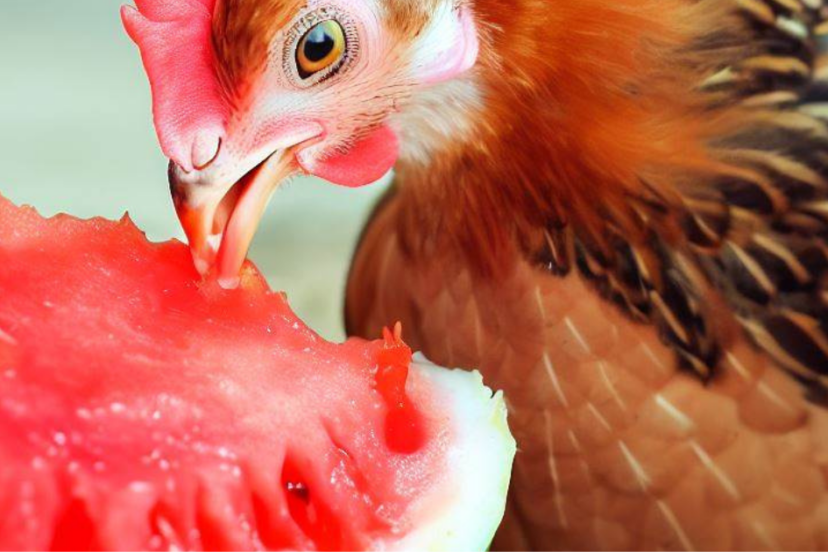Can Chickens Eat Watermelon: A Juicy Delight for Feathered Friends
Some commonly asked questions are can chickens eat avocado or can chickens eat oranges? In this article we will dive into another common question asked, can chickens eat watermelon, with its vibrant colors and juicy flesh, is a quintessential summer treat. But can chickens partake in this refreshing delight? Let’s delve into the world of watermelon and discover how it can benefit our feathered friends.
Exploring Watermelon Nutritional Value
Watermelon is not only delicious but also packed with nutrients. It is primarily composed of water, making it an excellent source of hydration for both humans and animals. In addition to water, watermelon contains essential vitamins, minerals, and antioxidants that contribute to overall health.
Benefits of Watermelon for Chickens

Feeding watermelon to chickens can have several benefits:
Hydration: Watermelon’s high water content helps keep chickens hydrated, especially during hot summer months.
Nutritional Boost: Watermelon is rich in vitamins A and C, as well as potassium, which can support chickens’ immune function and promote overall well-being. Further studies also indicate watermelons contain nutrients that assist to reduce stress related to climates and seasons with higher temperatures.
Enrichment and Entertainment: Pecking and enjoying the juicy flesh can provide enrichment for chickens, keeping them mentally stimulated and engaged.
Safe Practices for Feeding Watermelon
To ensure the safety and enjoyment of watermelon for chickens, follow these guidelines:
Choose Ripe and Fresh Watermelon: Select watermelons that are ripe, without signs of spoilage or mold.
Remove Seeds: Remove any seeds from the watermelon before feeding it to chickens, as seeds can pose a choking hazard.
Monitor Quantity: Offer watermelon as a treat or supplement, not as a primary food source. Monitor the amount given and consider it as part of their overall balanced diet.
Potential Risks and Moderation
While watermelon is generally safe for chickens, it’s important to exercise moderation. Excessive consumption of any food can upset their digestive system and lead to diarrhea. Introduce watermelon gradually and observe your chickens’ response.
How to Introduce Watermelon to Chickens

Follow these steps to introduce watermelon to your chickens:
Preparing Watermelon for Chickens
Wash the watermelon thoroughly to remove any dirt or contaminants. Cut it into appropriate-sized pieces for your chickens to peck and enjoy.
Serving Methods and Quantities
Offer watermelon to chickens in small pieces or cubes. Start with a small amount and gradually increase the quantity, observing how your chickens respond. Adjust the serving size based on the number of chickens and their size.
Monitoring Chickens’ Response
After feeding watermelon to your chickens, monitor their behavior, digestion, and overall well-being. If you notice any adverse effects, such as digestive upset or decreased appetite, reduce the quantity or discontinue feeding watermelon temporarily.
Watermelon as a Summer Treat
Watermelon’s refreshing and hydrating properties make it an ideal summer treat for chickens. Consider these additional benefits:
Hydration and Cooling Effects
During hot weather, watermelon can help keep chickens hydrated and cool. The juicy flesh provides a welcome respite from the heat and can contribute to their overall well-being.
Enriching Environments with Watermelon
To create a fun and engaging environment for your chickens, consider using watermelon creatively. Place slices or chunks in a shallow dish or hang them for pecking, turning mealtime into a delightful and entertaining experience.
Conclusion
In conclusion, chickens can indeed enjoy the juicy and refreshing treat of watermelon. With its high water content and nutritional benefits, watermelon can contribute to their hydration and overall well-being, especially during hot summer months. However, it’s important to offer watermelon in moderation, remove seeds, and monitor their response to prevent any digestive issues. Remember to provide a balanced diet for your chickens, with watermelon being a delightful addition to their meals. So, go ahead and treat your feathered friends to a juicy watermelon feast!
FAQs
1. Can chickens eat watermelon rinds?
While chickens can technically eat watermelon rinds, they are tough and less palatable. It’s best to focus on feeding them the juicy flesh and remove the rinds.
2. Can watermelon replace regular chicken feed?
No, watermelon should not replace regular chicken feed. It should be offered as a supplement or treat in addition to their balanced diet.
3. Are there any watermelon varieties that are toxic to chickens?
Generally, common watermelon varieties are safe for chickens. However, it’s best to avoid feeding them seedless watermelons, as the seeds may have been treated with chemicals that could be harmful to chickens.
4. Can watermelon attract pests or rodents?
Yes, the sweet aroma and juicy flesh of watermelon can attract pests and rodents. To prevent this, clean up any leftover watermelon and dispose of it properly.
5. Can chickens eat watermelon all year round?
Watermelon is a seasonal fruit, typically available during the summer. While it can be enjoyed occasionally throughout the year, it is best to provide it when it’s in season and readily available.
6. Can baby chicks eat watermelon?
It’s recommended to introduce watermelon to baby chicks after they have grown a bit and are accustomed to their regular feed. Offer small, finely chopped pieces to ensure they can consume it safely.
*We may earn a commission from purchases made through our links, at no cost to you. This does not affect our product recommendations. Please see our disclosure to learn more.




